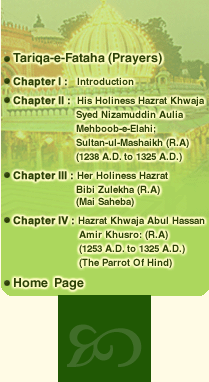But Allah Tala (God) saved him and managed
to release from captivity. He immediately left the city
of torture (Multan) and rushed to Delhi to see his anxious
mother. As soon as she saw her son-motherly instinct aroused
with love. He enjoyed the motherly great care and love.
The deep grief of brave Prince Khan
Mohd remained in his heart forever. He wrote the two elegy
(sorrowful poems) of Prince Khan Mohd describing him the
most generous, brave and good human being. At the old
age of eighty, King Balban called his second son Bughra
Khan from Bengal, but he refused to come back to Delhi.
After King Balban’s death his grandson Kikabad was made
the King of Delhi who was 17 years of age. Khusro remained
in his service for two years (686 A.H to 687 A.H/1286
to 1287 A.D.).
After the death of Kikabad, a turk
soldier Jalaluddin Khilji took power and became the King.
He was a poet and loved poets. Khusro was highly honoured
and respected in his Darbar and was known as "AMIR KHUSRO".
He was made secretary to the King "Mushaf-Dar". His status
was raised to ‘Amarat’; and was given the insigma of a
Silver belt and 1200 Tankas annually in lien of his services.
The darbar life made Amir Khusro focus more on literary
works. Barni writes, Khusro’s Ghazals which he composed
in quick succession at that time was set to music and
were sung by singing girls every night before King Jalaluddin
Khilji. Amir Khusro was rewarded beyond expectations and
was acknowledged in a following verse.
"The King of the world Jalale-Din,
in reward for my infinite pain which I undertook in
composing verses, bestowed upon me an unimaginable
treasure of wealth."
King Khilji was a brave soldier and
an able administrator. He expanded his Empire and won
four battles in a year. He ruled for 6 years from 689A.H/1289A.D
to 695A.H/1295A.D. He was murdered by the men of Allauddin
Khilji, his nephew and son-in-law. Allauddin Khilji then
ascended the throne of Delhi on 22nd Zilhaj
695A.H/1295A.D.
Amir Khusro wrote a short auto-biographical
Masnavi called "Shah Name mun"—of Allauddin’s life. Amir
Khusro was the few notables who blessed Allauddin Khilji.
Allauddin Khilji was one of the great
ruler of India in early Muslim empire. He was a strong
man, hard in nature, brave and intelligent soldier. He
expanded his Empire to Deccan in South and far to East
and west of India. He ruled for twenty one years. Hazrat
Amir Khusro (R.A) enjoyed his patronage and developed
much of his works. Amir Khusro in his book "Khazinatul-Futuh"
(the treasures of victory) penned down Allauddin’s construction
works, wars, peace and security, administrative services.
Further in another poetical work Masnavi "Matta-ul-Anwaar"
(Fountain of light) consisted of 3310 verses (completed
in 15 days) had the theme of "Love of God". The second
masnavi, "Shireen" consisted of 4000 verses. The third
Masnavi "Laila Majnu" story of Laila and Majnu and their
romance. The fourth voluminous Masnavi was "Aina-e-Sikandari"
had 4500 verses relating to the heroic deeds of Alexander
the Great. The fifth Masnavi was "Hasht Bahisht" related
to the events of King Bahram Gaur.
All these works made Amir Khusro
a leading luminary in the poetical world. The King Allauddin
Khilji was highly pleased by his works and rewarded him
handsomely.
After Allauddin Khilji death his
son Qutubuddin Mukarak Shah became the King. Amir Khusro
wrote a Masnavi on Mubarak Shah as "Nahsi Pahar" (Nine
Skies), a historical poetry relating the events of Mubarak
Shah. He classified his poetry in nine chapters, each
part is considered as a sky. In the third chapter he wrote
about India and its environment, the atmosphere and seasons,
flowers their varieties beauty and the fragrances, the
chirping of birds and their colourful gaiety the animals
world, education and sciences, ideology and religions
of India, languages spoken and their zones etc. This shows
how patriotic Khusro was to his motherland and had deep
knowledge of it. He wrote another voluminious book in
the period of Qutubuddin Mubarak Shah by name "Ejaze Khusravi",
the book consisted of five volumes. Thus it reflected
Amir Khusro’s ocean of knowledge and scholarship.
After Mubarak Shah, Ghyasuddin Tughlaq
came to the throne. Amir Khusro wrote a historic Masnavi
"Tughlaq Name" on him. Thus all Kings of their period,
honoured Amir Khusro as the jewel of their crown. They
felt proud of his writing. Thus Amir Khusro served seven
Sultans, saw seven Sultanates in his life time. He was
also an astronomer and an astrologer. When Qutubuddin
Mubarak Shah son was born, he prepared the horoscope of
child where certain predictions, were made. This horoscope
is included in the Masnavi "Saqiana".





